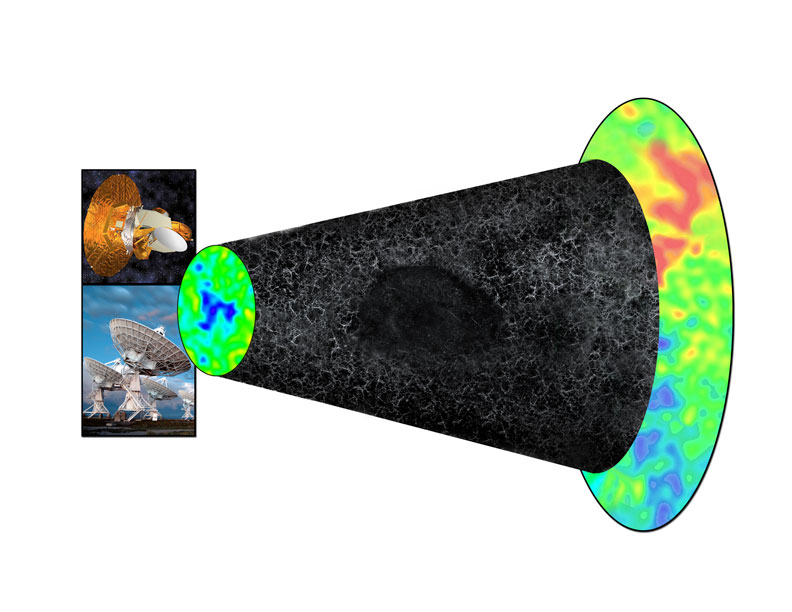26 August 2007
You’ve come here to read, but it’s not my words you are looking for.
What will it take? What can you do right now to realize that ordinary is an illusion, that your awareness is a miracle, your body an unexpected gift, your experience is unique and marvelous? To know this right up front and center, square in the crosshairs of your awake, what will take you there?
My words are useless. You are the one who knows what you can do.
You need no preparation. There is no better time. You can do it now.
– Josh Mitteldorf
25 August 2007
In 1916, when Einstein wrote down the equations that govern the flow of mass under gravitation, he found that the geometrical dependence was more complex and convoluted than the human mind could fathom. There were 16 intertwined equations, one for each pair of space-time dimensions. Each of the 16 equations depended on all 15 of the others. And each term in the 16 equations was actually the sum of 16 terms from another expression.
The large-scale structure of the universe is dominated by gravity, so these were the equations that had to be solved to learn about Cosmology. To untangle the complexity of the 16x16 equations, Willem de Sitter made the assumption that the Universe was as symmetric as it could be – that all directions in space were equivalent, and that the Universe was everywhere the same.
These assumptions are still made to this day: isotropy and homogeneity. They are part of the recipe that has led to conclusions about dark matter, dark energy, and the accelerating expansion of the Universe.
 |
University of Minnesota astronomers
have found an enormous hole in the Universe, nearly a billion
light-years across, empty of both normal matter such as stars,
galaxies and gas, as well as the mysterious, unseen “dark
matter.” While earlier studies have shown holes, or voids, in the
large-scale structure of the Universe, this new discovery dwarfs
them all.
“Not only has no one ever found a void this big, but we never even expected to find one this size,” said Lawrence Rudnick of the University of Minnesota astronomy professor. Rudnick, along with grad student Shea Brown and associate professor Liliya Williams, also of the University of Minnesota, reported their findings in a paper accepted for publication in the Astrophysical Journal. Science magazine Eurekalert article |
Why hasn’t anyone noticed this hole before? Because the Universe is three-dimensional and our view of the sky is two-dimensional, so it takes a lot of calculation to determine how far from us each galaxy is, then place them all on a 3-D map.
What does it all mean? A structure this large belies the assumption made by Einstein and de Sitter 91 years ago. It looks as though the universe is not homogeneous after all. We’ll just have to bite the bullet and tackle the 16 linked equations, each with 16 terms.
That’s what we get for taking computational shortcuts: if we had started 91 years ago, maybe we could have solved all those equations by now. Albert’s Mom told him all along he shouldn’t be so lazy.
24 August 2007
“Every day, God gives us the sun – and also one moment in which we have the ability to change everything that makes us unhappy. Every day, we try to pretend that we haven’t perceived that moment, that it doesn't exist – that today is the same as yesterday and will be the same as tomorrow...But that moment exists – a moment when all the power of the stars becomes a part of us and enables us to perform miracles.”
–from By the
River Piedra I sat Down and Wept by Paulo
Coehlo, born this day in 1947
23 August 2007
Thou hast made me endless, such is thy pleasure. This frail vessel thou emptiest again and again, and fillest it ever with fresh life.
This little flute of a reed thou hast carried over hills and dales, and hast breathed through it melodies eternally new.
At the immortal touch of thy hands my little heart loses its limits in joy and gives birth to utterance ineffable.
Thy infinite gifts come to me only on these very small hands of mine. Ages pass, and still thou pourest, and still there is room to fill.
22 August 2007
“We are the miracle of force and matter making itself over into imagination and will. Incredible. The Life Force experimenting with forms. You for one. Me for another. The Universe has shouted itself alive. We are one of the shouts.”
– Ray
Bradbury is 87 years old today.
21 August 2007
What part of our sense of self is socially constructed, differing from culture to culture? How much is unique to humans, and what can be experienced by other animals? We find it natural to imagine the inner lives of dogs; can it make sense to talk about the inner life of a machine?
Beginning in 1970, Gordon Gallup began to ask these questions with studies of animal behavior around mirrors. Chimpanzees, orangutans, elephants, whales and dolphins recognize their image. Most gorillas and monkeys don’t. Dogs, cats and toddlers don’t pass the test – does this mean it’s the wrong test?
Ten-year-old children pass
some tests for self-awareness that
five-year-olds mostly fail. We feel intuitively that
self-awareness requires
consciousness, but perhaps consciousness is not sufficient to insure
self-awareness.
Douglas Hofstadter has theorized that the ability to conceive of the
self and reflect upon it is the essence of a soul.
20 August 2007
“How wonderful it is that nobody need wait a single moment before starting to improve the world.”